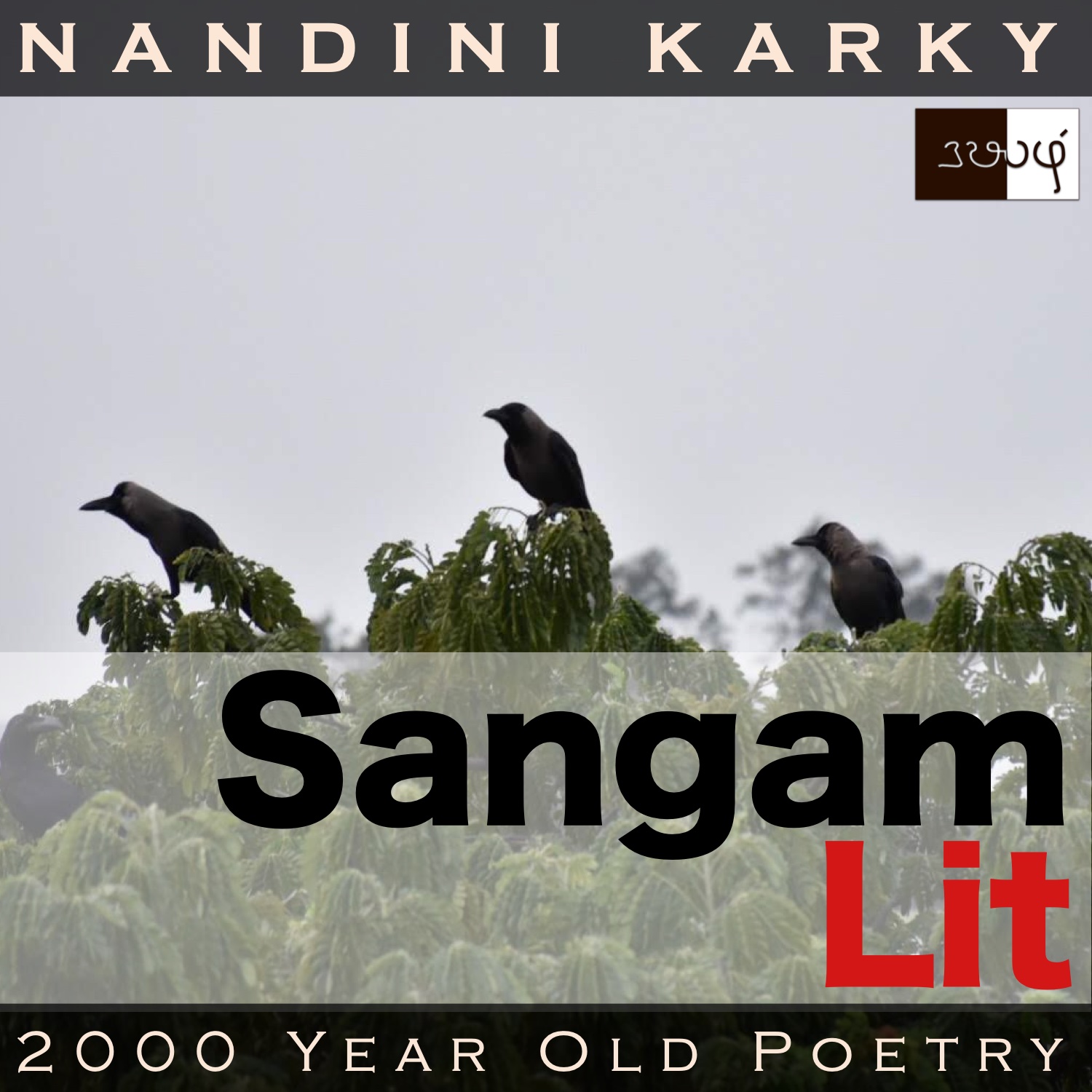Podcast: Play in new window | Download
Subscribe: Apple Podcasts | Spotify | Amazon Music | Android | iHeartRadio | TuneIn | RSS | More

In this episode, we hear the jubilant news of a man’s imminent homecoming, as portrayed in Sangam Literary work, Natrinai 367, penned by Nakkirar. Set in the forest regions of ‘Mullai’, the verse speaks in the voice of the confidante to the lady, conveying to her that good times are arriving at her doorstep.
கொடுங் கண் காக்கைக் கூர் வாய்ப் பேடை
நடுங்கு சிறைப் பிள்ளை தழீஇ, கிளை பயிர்ந்து,
கருங் கண் கருனைச் செந்நெல் வெண் சோறு
சூருடைப் பலியொடு கவரிய, குறுங் கால்
கூழுடை நல் மனைக் குழுவின இருக்கும்
மூதில் அருமன் பேர் இசைச் சிறுகுடி
மெல் இயல் அரிவை! நின் பல் இருங் கதுப்பின்
குவளையொடு தொடுத்த நறு வீ முல்லைத்
தளை அவிழ் அலரித் தண் நறுங் கோதை
இளையரும் சூடி வந்தனர்: நமரும்
விரி உளை நன் மாக் கடைஇ,
பரியாது வருவர், இப் பனி படு நாளே.
The verse opens with ‘கொடுங் கண் காக்கை’ which talks about ‘a crow and its habit of curving its neck and thereby, its eyes, when looking at something’. Anyone who has observed a crow for a while, will know what this ancient poet means. ‘நடுங்கு சிறைப் பிள்ளை’ means ‘a chick with shivering feathers’ and subtly hints at the season that makes this happen. The phrase ‘கருங் கண் கருனைச் செந்நெல் வெண் சோறு’ would be a delight for those exploring ancient food habits for it means ‘cooked red rice with black-eyed elephant foot yam’. This talks about a dish that remains in vogue in Kerala and Tamilnadu, as well as many other parts of India today. A historical character ‘அருமன்’ and his town ‘சிறுகுடி’ greet us in this verse. The flowers that render their name to the region make an appearance in ‘நறு வீ முல்லை’ meaning ‘fragrant wild jasmine’. ‘விரி உளை நன் மா’ talks about ‘a fine animal with a windswept mane’, no doubt referring to a speeding horse. Ending with ‘பரியாது வருவர், இப் பனி படு நாளே’ meaning ‘he shall come without fail, this cold day’, the verse echoes with assurance.
The man and lady had been leading a happy, married life when the man had to part away on a mission. The lady languishes without his company and is overwhelmed as the promised season arrives. At this time, the confidante tells her, “A sharp-beaked, female crow that gazes curving its eyes, seeing the shivering feathers of its chick, embraces it and then, flies along with its kith and kin, to eat black-spotted yam with white rice made from red paddy, which are sacrificial offerings to divine spirits. Those short-legged crows, intending to feed on the offerings, gather around the good and ancient home of ‘Aruman’ in his vastly famous town ‘Sirukudi’. Akin to that ‘Sirukudi’, is your gentle nature, O young girl! The cool and aromatic garland, made with the fragrant, wild jasmine’s full-bloomed flowers, which you love to adorn on your thick, dark, blue-lily-like tresses, was worn by the lord’s attendants, who have arrived. Riding his fine horse with a flying mane, the lord too will arrive, without any delay, on this day of the cold season.” With these words, the confidante renders the news of the man’s approaching arrival and predicts a happy future for the lady.
Time to delve into the details! The confidante starts her conversation by focusing on a female crow, which is seen hugging its shivering chick. This hints to us that the cold season had arrived then and we can imagine the pain in the lady’s heart, parted from the man. After registering this image, the confidante points to how the female crow is flying along with the members of its group, intent on eating the ‘red rice and yam’ that was customarily offered to divine spirits in homes. In many other poems, we see this habit of offering food balls to gods, which get inevitably eaten by crows that abound homes. This particular item on the menu is a traditional South-Indian dish, made by mashing elephant foot yam with spices and serving it as accompaniment for a rice dish. This variety of yam is said to have plenty of nutritional benefits which include sharpening concentration, fighting carcinogens, and delivering instant energy too. No wonder it was a preferred dish of the crows! Returning to the verse, the confidante is not making a generic statement about food offerings and crows but localising it to the ancient house of a leader named ‘Aruman’ in his well-known town of ‘Sirukudi’. A house considered ancient in those ancient times – wonder what that means. Numbers elude us but the respect that was felt for the old house can be sensed even two thousand years later!
The confidante has referred to this famous ‘Sirukudi’ only to place it in parallel with the lady’s gentle nature. Then she refers to the preference of the lady for wearing fragrant wild jasmine flowers on her blue-lily-like, thick tresses, and remarks how those flowers were worn by the lord’s attendants when they returned. It was the custom of men returning from war or any mission to wear these flowers, remembering their beloved waiting with patience in the pasture lands of ‘Mullai’. Adding to this, the confidante stresses how the lord too will arrive at any moment, hastening his fine horse and making its mane fly in the wind, to slay the sorrow of the lady on that cold day. In that scene of the crow embracing its young one and feeding on the fine offerings along with its family, the confidante places a metaphorical prediction about how the lady, who is now comforting her young child, would soon delight with the victorious offerings of the returning man, and share that wealth with their kith and kin. Interesting to perceive the contrast in the sense of community and celebration evoked in this song on an individual’s pining in parting!




Share your thoughts...